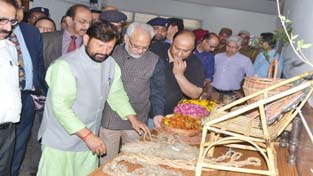Excelsior Correspondent
JAMMU, Mar 14: National workshop on “Climate Crisis: Vulnerabilities and Adaptation Strategies-Science and Policy Interface” was inaugurated by Choudhary Lal Singh, Minister for Forest, Ecology and Environment, here today at University of Jammu
The two-day workshop is jointly organized by Department of Environmental Science, JU and State Climate Change Centre-J&K, Department of Ecology, Environment and Remote Sensing, Government of Jammu and Kashmir.
In his inaugural remarks, Choudhary Lal Singh shared experiences and efforts of his department towards environmental conservation. He emphasized the role of an individual in sustainable development of the society and asserted that speed of individual change is precursor to enhanced climate change. He suggested that individuals need to change self-centric approach and should take care of their immediate environment and social responsibilities. He stressed that priority should be given to traditional knowledge base of indigenous population in tackling the issues related to sustainable development of the region and climate change in particular.
In his presidential address, JU Vice-Chancellor Professor R D Sharma elaborated the efforts made by University for environmental protection and greening the campus. He highlighted the activities of Green Campus Task Force, Save Tawi Campaign and incorporation of Environmental Science as a component at various stages of curriculum development.
Ravi Kumar Kesar, Principal Chief Conservator of Forests, J&K emphasized the need to sustainably develop Himalayan regions as mountainous areas are more vulnerable to climate change than the plains. He said that forests of Himalayan region are threatened due to ever-growing need of timber, fuelwood and grazing and showed concern over loss of forest biota due to increase in temperature.
Saurabh Bhagat, Commissioner/Secretary Forest, Ecology and Environment, said that unless we address the causes of climate change, we have to be ready to face consequences.
The keynote address was delivered by Professor S P Singh, FNA and Ex Vice-Chancellor, HNB Garhwal University, Uttarakhand. In his address on ‘Climate change effects in Himalayas and their interactions’, Professor Singh demonstrated why Himalayas are so critical in terms of climate change and country’s economy. He underlined the urgency to adopt India centric models for mitigating climate change.
Vote of thanks was presented by Om Prakash Sharma, Director, Ecology, Environment and Remote Sensing.


